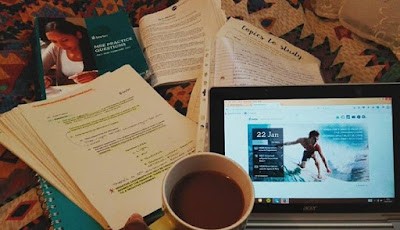I was still working three days a week, so I had at least 8 hours in the day where I wasn't thinking about the exam. But when evening came, it was time to hit the books again. By this time, I had stopped learning new content. Whatever I knew, I knew and was it was instilled in my brain somewhere and I was holding on to the belief that everything would come flooding back to me when it was time to answer the questions in the exam, (which by the way it did and I even got excited in the exam when I experienced this lol, but I'll delve more into that in a later post).
During the last four weeks leading up to the exam, I focused on strengthening my knowledge on the topics I previously struggled with first time round; tackling any exceptions to rules that I was still unsure about and tightening my essay and multiple choice exam strategies. When there's twelve areas of law which you have to learn for a two day exam, especially when you're re-sitting exams, you really don't want to spend time going over what you already know. It's what you don't know well where your time and effort needs to be spent.
In the multiple choice questions, you know that there are two completely wrong answers. You have to use the power of elimination techniques to eliminate those wrong answers, from reading the closing sentence of the question (and maybe a few sentences above the closing sentence), before you read and analyze the whole question, so that you can narrow it down and focus on the two remaining answers. When you've got 200 fact pattern multiple choice questions to answer (separated by 100 questions in the morning and another 100 questions in the afternoon, in three hour exam segments), time management is everything.
I was constantly doing essay and multiple choice practice questions every other day and reviewing my answers. This was really helpful second time round, as I didn't spend as much time as I could have on practice questions when I sat the bar exams for the first time in 2016.
During the last few weeks, I was still somewhat antisocial, not doing much with others outside of work and studying, but I did spend time in between study breaks to go for walks, exercising, and going to church. Prayer, meditating on the scriptures and being outside around nature kept me sane!
Although it was an intense time, I refused to allow it to completely take over my life, to the point where I may become obsessive about the exams. I had to have a balance and so do you. Get enough sleep (your brain and body needs this), go to the gym (or exercise at home) to let off steam, go for walks, bake, cook, sew, paint or do whatever you find therapeutic and relaxing to help you take your mind off things for a few hours when it gets a little bit too much. When you go back studying, you will feel rejuvenated and have a clearer head to think and absorb more information. You may even see things you didn't notice before.
